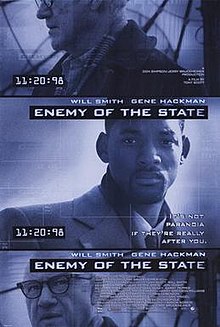
Eugene Allen Hackman is an American retired actor. In a career that spanned more than six decades, he received two Academy Awards, two BAFTA Awards, four Golden Globes, a Screen Actors Guild Award, and the Silver Bear. Hackman's two Academy Award wins included one for Best Actor for his role as Jimmy "Popeye" Doyle in William Friedkin's acclaimed thriller The French Connection (1971) and the other for Best Supporting Actor for his role as "Little" Bill Daggett in Clint Eastwood's Western film Unforgiven (1992). His other Oscar-nominated roles were in Bonnie and Clyde (1967), I Never Sang for My Father (1970), and Mississippi Burning (1988).

The spy film, also known as the spy thriller, is a genre of film that deals with the subject of fictional espionage, either in a realistic way or as a basis for fantasy. Many novels in the spy fiction genre have been adapted as films, including works by John Buchan, le Carré, Ian Fleming (Bond) and Len Deighton. It is a significant aspect of British cinema, with leading British directors such as Alfred Hitchcock and Carol Reed making notable contributions and many films set in the British Secret Service.

The Ring is a 2002 American psychological supernatural horror film directed by Gore Verbinski and written by Ehren Kruger, and stars Naomi Watts, Martin Henderson, David Dorfman, Jane Alexander and Brian Cox. It is a remake of Hideo Nakata's 1998 film Ring, based on the 1991 novel by Koji Suzuki. Watts plays Rachel Keller, a journalist who discovers a cursed videotape that kills the viewer seven days after viewing it.
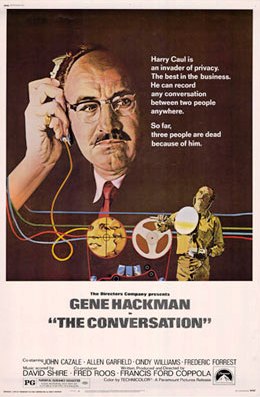
The Conversation is a 1974 American neo-noir mystery thriller film written, produced, and directed by Francis Ford Coppola and starring Gene Hackman, John Cazale, Allen Garfield, Cindy Williams, Frederic Forrest, Harrison Ford, Teri Garr, and Robert Duvall. Hackman portrays a surveillance expert who faces a moral dilemma when his recordings reveal a potential murder.

Jerome Leon Bruckheimer is an American film and television producer. He has been active in the genres of action, drama, comedy, fantasy, horror and science fiction. After working in advertising out of college, Bruckheimer moved into film production in the 1970s. In the 1980s and 1990s, he partnered with fellow producer Don Simpson. Bruckheimer and Simpson's partnership continued until Simpson's death in 1996. Bruckheimer has produced films including Flashdance, The Rock, Crimson Tide, Con Air, Armageddon, Enemy of the State, Pearl Harbor, Black Hawk Down, and Kangaroo Jack, as well as the Beverly Hills Cop, Top Gun, Bad Boys, Pirates of the Caribbean, and National Treasure franchises.
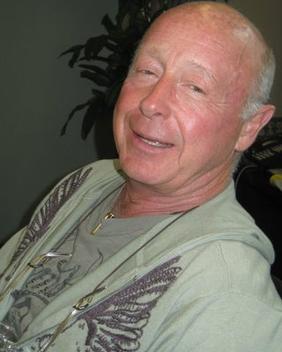
Anthony David Leighton Scott was an English film director and producer. He made his theatrical film debut with The Hunger (1983) and went on to direct highly successful action and thriller films such as Top Gun (1986), Beverly Hills Cop II (1987), Days of Thunder (1990), The Last Boy Scout (1991), Crimson Tide (1995), Enemy of the State (1998), Man on Fire (2004), Déjà Vu (2006), and Unstoppable (2010).
Loren Dean is an American actor. He has appeared on stage and in feature films, including as the title character in Billy Bathgate, as well as Apollo 13, Rosewood, Space Cowboys, and Ad Astra. He also appeared in a recurring role on the television series Bones.

Crimson Tide is a 1995 American submarine action thriller film directed by Tony Scott and produced by Don Simpson and Jerry Bruckheimer. It takes place during a period of political turmoil in Russia, in which ultranationalists threaten to launch nuclear missiles at the United States and Japan.

XXX: State of the Union (released as XXX2: The Next Level and XXX: State of Emergency outside North America) is a 2005 American action spy film directed by Lee Tamahori and a sequel to the 2002 film XXX. It is the second installment of the XXX film series, and was produced by Revolution Studios for Columbia Pictures.
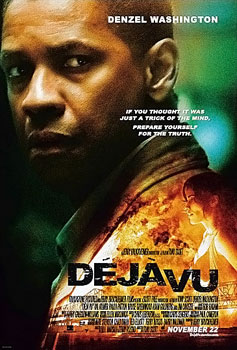
Déjà Vu is a 2006 American science fiction action thriller film directed by Tony Scott, written by Bill Marsilii and Terry Rossio, and produced by Jerry Bruckheimer. The film stars Denzel Washington, Paula Patton, Jim Caviezel, Val Kilmer, Adam Goldberg and Bruce Greenwood. It involves an ATF agent who travels back in time in an attempt to prevent a domestic terrorist attack that takes place in New Orleans and to save a woman with whom he falls in love.

The Terrorist Surveillance Program was an electronic surveillance program implemented by the National Security Agency (NSA) of the United States in the wake of the September 11, 2001 attacks. It was part of the President's Surveillance Program, which was in turn conducted under the overall umbrella of the War on Terrorism. The NSA, a signals intelligence agency, implemented the program to intercept al Qaeda communications overseas where at least one party is not a U.S. person. In 2005, The New York Times disclosed that technical glitches resulted in some of the intercepts including communications which were "purely domestic" in nature, igniting the NSA warrantless surveillance controversy. Later works, such as James Bamford's The Shadow Factory, described how the nature of the domestic surveillance was much, much more widespread than initially disclosed. In a 2011 New Yorker article, former NSA employee Bill Binney said that his colleagues told him that the NSA had begun storing billing and phone records from "everyone in the country."

Loose Cannons is a 1990 American action comedy film written by Richard Matheson, Richard Christian Matheson and Bob Clark, who also directed the film. The film stars Gene Hackman as a hard-nosed cop who is teamed up with a detective with multiple-personality disorder, played by Dan Aykroyd, to uncover a long-lost Nazi sex tape, featuring Adolf Hitler, which would jeopardize the political future of the German chancellor-elect. The theme song features vocals by Katey Sagal and Aykroyd.
Dick Richards is an American film director, producer, and screenwriter. Known as a storyteller and an "actor’s director", Richards worked with Robert Mitchum, Gene Hackman, Martin Sheen, Blythe Danner, Catherine Deneuve, Alan Arkin, Wilford Brimley, and many others.

Sharky's Machine is a 1981 American neo-noir action thriller film directed by Burt Reynolds, who stars in the title role. It is an adaptation of William Diehl's first novel Sharky's Machine (1978) with a screenplay by Gerald Di Pego. It also stars Vittorio Gassman, Brian Keith, Charles Durning, Earl Holliman, Bernie Casey, Henry Silva, Darryl Hickman, Richard Libertini, Rachel Ward and Joseph Mascolo.

PRISM is a code name for a program under which the United States National Security Agency (NSA) collects internet communications from various U.S. internet companies. The program is also known by the SIGAD US-984XN. PRISM collects stored internet communications based on demands made to internet companies such as Google LLC and Apple under Section 702 of the FISA Amendments Act of 2008 to turn over any data that match court-approved search terms. Among other things, the NSA can use these PRISM requests to target communications that were encrypted when they traveled across the internet backbone, to focus on stored data that telecommunication filtering systems discarded earlier, and to get data that is easier to handle.
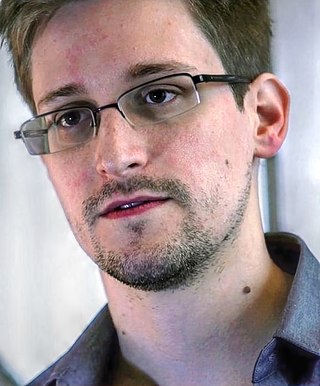
Edward Joseph Snowden is an American and naturalized Russian citizen who was a computer contractor who leaked highly classified information from the National Security Agency (NSA) in 2013 when he was an employee and subcontractor who is currently under indictment for espionage. His disclosures revealed numerous global surveillance programs, many run by the NSA and the Five Eyes intelligence alliance with the cooperation of telecommunication companies and European governments and prompted a cultural discussion about national security and individual privacy.

My Fellow Americans is a 1996 American political comedy film directed by Peter Segal. It stars Jack Lemmon and James Garner as feuding ex-presidents, with Dan Aykroyd, Lauren Bacall, Esther Rolle, John Heard, Wilford Brimley, Bradley Whitford, Everett McGill, and Jeff Yagher in supporting roles. The film is named after the sentence for the traditional opening of presidential addresses to the American people. Walter Matthau was slated to star in the film, but he dropped out and Garner was chosen to star with Lemmon for their first film together.

During the 2010s, international media news reports revealed new operational details about the Anglophone cryptographic agencies' global surveillance of both foreign and domestic nationals. The reports mostly relate to top secret documents leaked by ex-NSA contractor Edward Snowden. The documents consist of intelligence files relating to the U.S. and other Five Eyes countries. In June 2013, the first of Snowden's documents were published, with further selected documents released to various news outlets through the year.

Former U.S. President Barack Obama favored some levels of mass surveillance. He has received some widespread criticism from detractors as a result. Due to his support of certain government surveillance, some critics have said his support violated acceptable privacy rights, while others dispute or attempt to provide justification for the expansion of surveillance initiatives under his administration.
